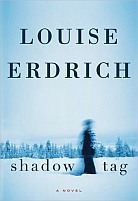FICTION
|
|

|
|

George
Catlin (1849) by
William Frisk
|

Lucretia by Rembrandt
|

Schrödinger:
Austrian theoretical
physicist who achieved
fame for his contributions to quantum mechanics, especially the
Schrödinger equation, for which he received the Nobel Prize in
1933.
|
|
BOOK
ILLUMINATIONS
From Merrimon Book Reviews
|
|
Shadow Tag

by Louise Erdrich

Powerful,
provocative yet self-absorbed
Irene America knows her
artist husband Gill reads her diary. Already there is little
privacy between them. She is the fury and muse upon which his
paintings depend. Knowing he has broken into her private space,
she uses that knowledge to manipulate him. She writes in her red
journal what she wants him to hear while keeping a blue journal locked
away from his gaze. Irene attempts to free herself from her
husband's grasp through the journal and through innuendo. As the
marriage fails, sinking into cruelty, addiction and even abuse, the
children react with various responses.
SHADOW TAG is a
provocative novel, inspiring love and hatred in readers and for some
readers, like myself, a mixture of both. As in previous novels,
Louise Erdrich's prose has a poetic textual beauty. Absent are
quotation marks and traditional textual conventions and yet the
language flows with a powerful ability to plunge the reader into the
dynamics of the relationship. Several references to
Native-American culture add a spiritual dimension to the sometimes
trivial surface dance between the characters' actions. As the
marriage falls apart, the author's powerful storytelling brings the
reader into the scenes. Neither Gil not Irene are likable, sympathetic
characters. Louise Erdrich does an excellent job in showing how
the marriage has destroyed Irene from the inside. Irene, however,
is no innocent martyr. Her passive aggressive cruelty elicits a
certain contempt. At times, one feels a certain sympathy for Gil
in response to her restrained attacks, and yet, Gil's actions and his
artistic obsession equally repulse. Perhaps the most intriguing
aspect of this novel emerges at the end as the author adds narrative
layers to the journals and previous third person story. For those
fascinated by literary criticism, the novel SHADOW TAG poses intriguing
questions about art and narrative, of subject and object, of the gaze,
and the relationship between art and desire. For all those
reasons, SHADOW TAG
fascinates this reader.
At the same time, SHADOW TAG
might repel readers for a variety of reasons, the least of which is
guided by the romance genre's expectations of likable characters and a
happy ending, a genre to which this novel clearly does not belong or
pretend. On one level, the novel has a self-indulgent tone that
trivializes both the marriage and the artwork with overblown references
to the obsession of the artist mixed among Irene's passive attempts to
break away. Louise Erdrich creates a powerful look into the
spiraling inward focus of a bad marriage and the artist's relationship
to Irene as the object of paintings more than as a woman, but in the
end, the inward look creates a banality and triteness that diminishes
the power of the ending. Even the Native-American references lack the
force conveyed by cultural references in the author's previous
works. I find it most difficult to review this book given my
widely diverging responses to this novel. Undoubtedly, others
will find themselves loving or hating the novel or just ambivalent
based on their own interests and reading history. Though in the
past, I have eagerly awaited the opportunity to lose
myself in Louise Erdrich's magical lyricism, SHADOW TAG's self-absorption takes
precedence despite the emotional power and the fascinating intellectual
literary questions it poses.
Publisher: Harper
(February 2, 2010)
Reviewed by Merrimon,
Merrimon Book Reviews
Review Courtesy of Amazon Vine

|
|
|